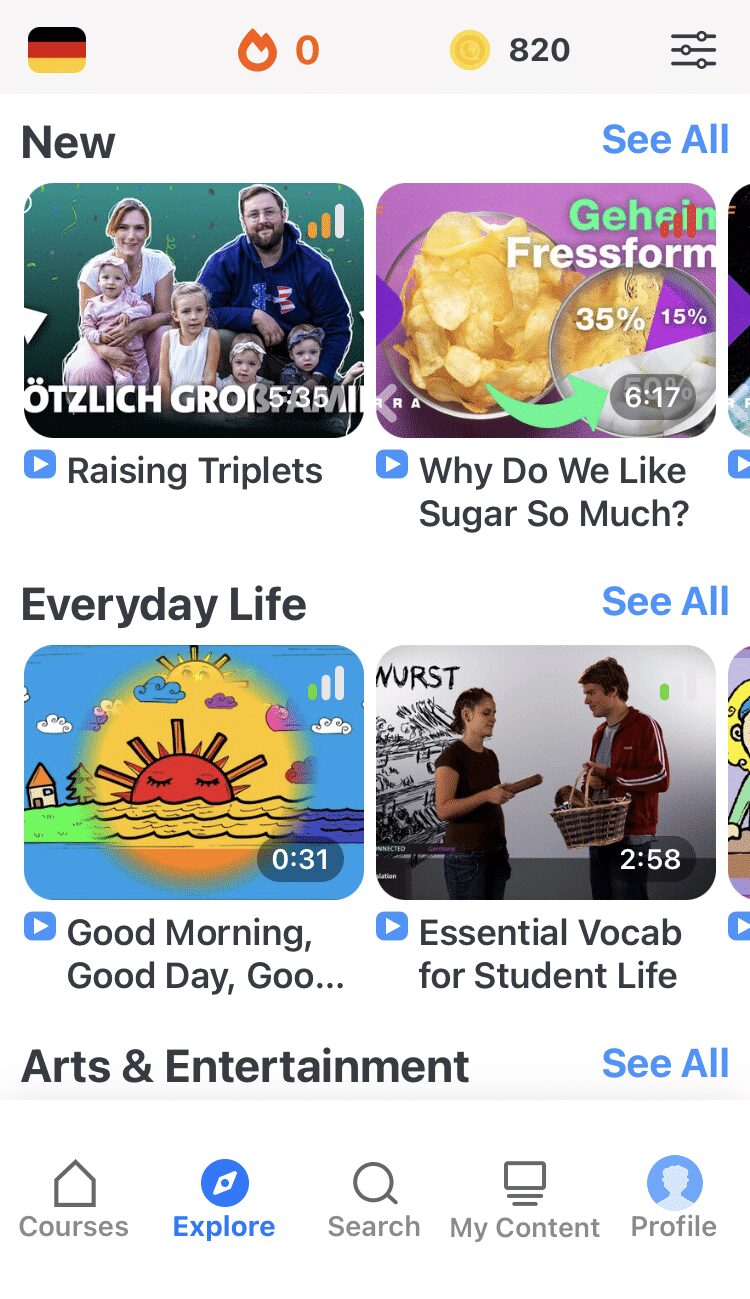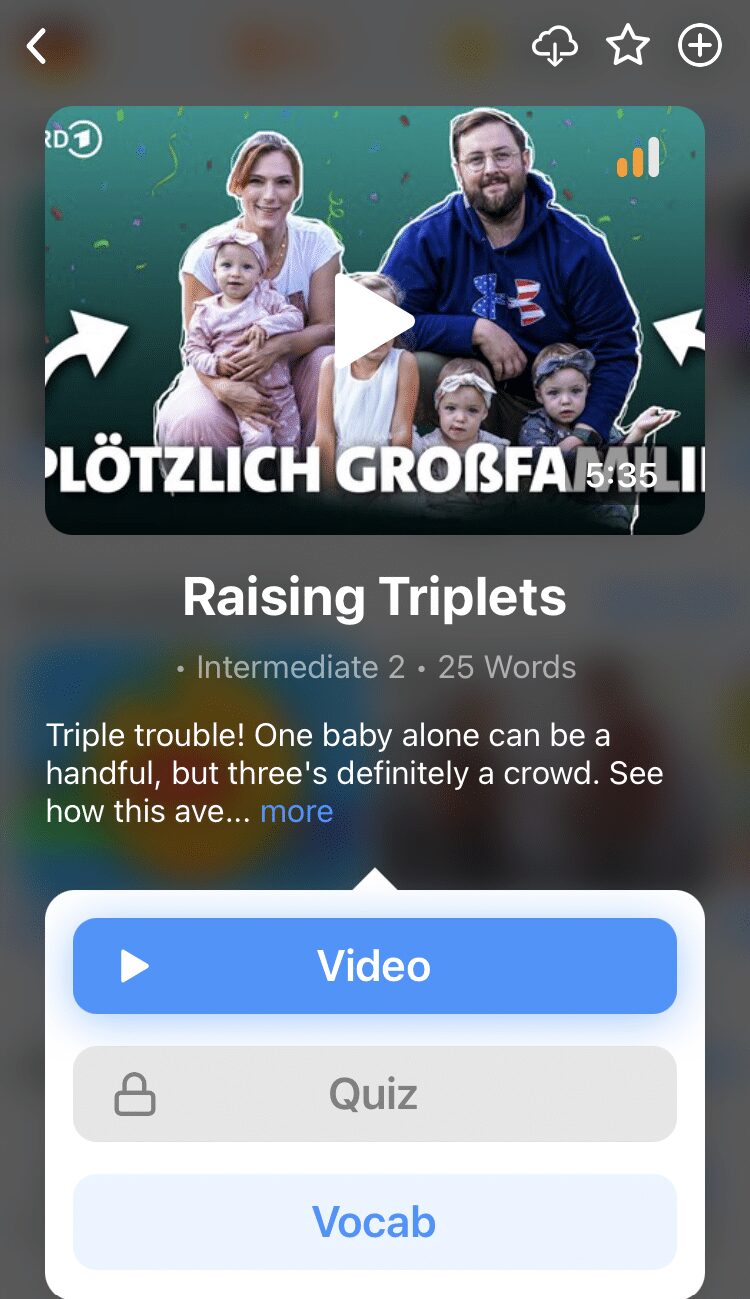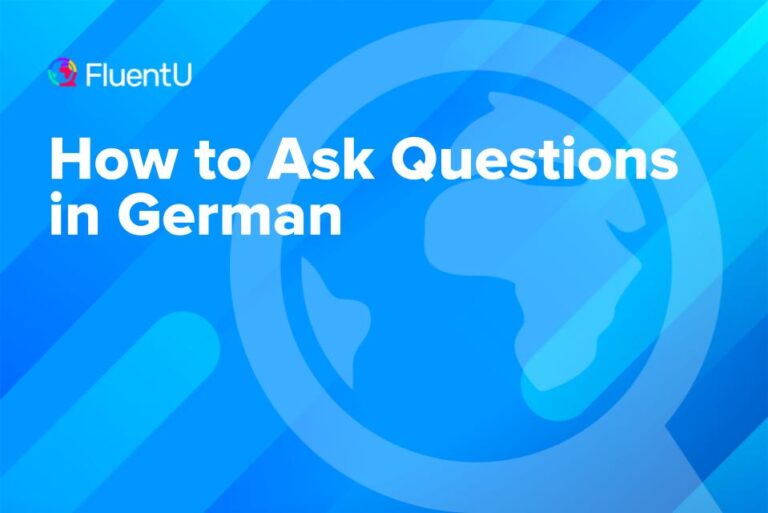Contents
- The 14 Most Common German Slang Words
- 50 More German Slang Words
- 17 Common German Slang Expressions You Should Know
- 1. auf dicke Hose machen
- 2. gebongt sein
- 3. Was geht ab?
- 4. nicht alle Tassen im Schrank haben
- 5. Bock haben
- 6. die Nase voll haben
- 7. einen dicken Hals haben
- 8. aus der Reihe tanzen
- 9. Mach’s gut!
- 10. Grüß Gott!
- 11. Na ja…
- 12. auf Jeden Fall
- 13. im Prinzip
- 14. das Leben ist kein Ponyhof
- 15. nur ein Schwein trinkt allein
- 16. der Rubel muss rollen
- 17. auf den Sankt Nimmerleinstag
- 54 More German Slang Expressions
- 14 German Text Slang to Say “TTYL” to Your German-speaking Friends
- And One More Thing...
149 German Slang Words and Phrases

Think about all the English slang you use with friends on a daily basis.
Well, the German you’ll hear on the streets ain’t the stuffy language used in your textbooks, either!
Here are 149 German slang words and expressions that, while they’d likely cause the average textbook editor to clutch their metaphorical pearls, can spice up your German skills.
By the way, the German word for “slang” is umgangssprache . Keep that in mind in case you want to ask your German-speaking friends to teach you more of these cool words!
Download: This blog post is available as a convenient and portable PDF that you can take anywhere. Click here to get a copy. (Download)
The 14 Most Common German Slang Words
1. Na?
Na? might be the shortest way of asking about someone’s wellbeing in any language. It’s a way to say “Hello” and “How are you doing?” at the same time. There’s even a special intonation to it.
To be a bit clearer about what you mean, you can combine Na? with other forms of greeting like Na, alles gut? (Well, is everything good?), Na, wie gehts? (Hey, how are you?) or Na, was geht ab? (So, what’s going on?).
The best part is that Na? also serves as a reply to itself. Na? – Naaa? is a complete conversation in which both parties have said hello and asked how life is going.
Benjamin:
Na, alles klar?
(Hey, everything good?)
Lena:
Ja und bei dir?
(Yes, you?)
2. chillen
The German verb chillen comes from the English “to chill.” It basically has the same meaning: to hang out, rest and generally take it easy.
The word also has an adjective form, chillig , which is mostly used to describe a laidback atmosphere or relaxing surroundings while having a chill night.
Interestingly, in German, you often chill in rounds. Eine Runde chillen is an important part of the weekend activities for many younger Germans.
Rhea:
Wir wollen an den See fahren und eine Runde chillen.
(We want to go to the lake and chill for a bit.)
Tom:
Nach der Arbeit will ich erstmal chillen.
(After work, I wanna chill first.)
3. Tschüß!
This one means “goodbye,” whether it’s on the phone or in person. You’ll hear it so much that you’d be surprised at just how often it replaces the proper goodbye, Auf Wiedersehen , in daily life.
A friend who was visiting me from the States pointed out that when we say Tschüß, we raise the tone of our voices a full octave. There’s even a bit of a singsong melody when you say it.
Variants include tschü, tschü-tschü and tschüßi (the i is a common, cutesy diminutive used for all sorts of things). Tschüß can truly give your vocal range a bit of exercise every day.
Ingrid:
Dann sehen wir uns morgen. Tschüß!
(I’ll see you tomorrow then. Bye!)
Petra:
Bis dann! Tschüßi!
(See you then! Byeee!)
4. Ciao!
Germans respect their southern neighbors so much that many have adopted their greeting in German.
Italians are actually the largest group of non-Germans in Germany after the Turkish, and there was even a relatively small group of Italian Gastarbeiter (guest workers) brought into the country in the 1950s.
Germans have loved going to Italy since the days of Goethe, so it’s only natural that such a snappy farewell got picked up by savvy Germans.
Carolina:
Besuche mich bald! Ciao!
(Come visit me soon! Bye!)
Monika:
Mach ich! Ciao!
(I will! Bye!)
5. Servus!
A common greeting in the south, this one literally means “I am your servant” in Latin. Before you get weirded out by it, just know that it’s mostly used in certain parts of Germany, like Bavaria and Austria.
A more modern interpretation of the literal meaning would be something like “at your service.” You can use it to say either “hello” or “goodbye.”
Josef:
Servus!
(Greetings!)
Maria:
Ach, kommst du aus Bayern?
(Oh, are you from Bavaria?)
6. nö / nee
Rather than actually saying nein in conversation, you’ll hear nö said much more often. This one is more about the intonation than the actual meaning and is an informal way of saying “no.”
Hearing this word is like fingernails on a chalkboard to an Austrian though, where they say jo and na instead of ja and nö, respectively.
It’s kind of like saying “nah,” so make sure that you use it with friends instead of strangers or people you don’t know well.
Günter:
Noch ein Bier?
(Another beer?)
Karl:
Nö, mir ist satt.
(Nah, I’m full.)
7. Jaaa-haaa! Neeeiii-heiiin!
It sounds a little childish, but if you’re being skeptical about what someone said, a German might emphasize that they’re not exaggerating by stretching out the word ja and putting an h in the middle of it.
The resulting word ends up sounding like two syllables instead of one. You, of course, have to add the super annoyed tone to it for the full effect.
It’s something that kids will say to each other if they’re having an argument, and it always sounds a little childish. You can extend the vowel in any word for emphasis by adding an h.
Jonas:
Bist du dir sicher, dass du den Ofen ausgemacht hast?
(Are you sure that you turned off the oven?)
Sebastian:
Jaaaa-haaaa! Bin doch nicht duuu-huuum!
(Yeeeee–hessss!!! I’m not stuuuu–piddddd!)
8. geil
Geil is a difficult word for German learners to use because it can mean “horny,” “good-looking” and “cool” at the same time. In everyday conversation, it ends up being used when something is cool.
You can also see it in pop culture. If you say leider geil (unfortunately geil), it refers to the song Leider Geil by Deichkind (NSFW), which is about things that are awesome but also have negative side effects.
Friedrich Liechtenstein, a famous German actor and singer, made the viral video Supergeil. This was so popular that he was asked to make a parody sequel by the German supermarket chain Edeka, which is even funnier.
Emilia:
Ich hab Rammstein Tickets gekauft!
(I bought Rammstein tickets!)
Clara:
Oh geil! Kann ich auch mitkommen?
(Oh cool! Can I come, too?)
9. krass
Krass literally means “crass,” “stark” or “blatant” in English.
In German, its meaning has been broadened and the word can be used to describe almost anything in a more intense way. It doesn’t necessarily have to be something negative.
You could say something like Krasse Musik! (cool music!) or Krasses Essen! (nice food!) If you say it in response to what someone just said, it could be understood as “damn” to indicate surprise or shock.
Ida:
Ich bin vorhin meinem Ex mit seiner neuen Freundin begegnet!
(I ran into my ex with his new girlfriend earlier!)
Thomas:
Krass! Wie hast du reagiert?
(Damn! How did you react?)
10. Alter
This slang word is popular with young people. It literally means “age,” but is used as “dude,” “mate” or “man.” Only use this one if you’re down with the kids!
One possible origin of this is another slang phrase alter Schwede, which literally means “old Swede.” You can use this entire phrase when you’re expressing surprise or disbelief.
Alter Schwede is said to date back to the Thirty Years War, when Swedish soldiers that were older and more experienced were hired to train Prussian armies. The phrase has apparently stuck.
Paul:
Alter, hast du wirklich so viel bezahlt?
(Dude, did you really pay that much?)
Elias:
Ja, ich fühle mich so dumm.
(Yeah, I feel so silly).
11. Hä?
Germans have a lot of hand expressions to indicate that they think someone is stupid or crazy.
One of them is waving their hand in front of your eyes, as if they’re checking if you’re still alive by seeing if your eyes are responding to light. Another is a vigorous thrust with the index finger into the forehead.
These expressions are often accompanied by the sound “Häää?”, which means “what the heck!”
Ida:
Ich glaube, ich rufe mal Oskar an.
(I think I’m going to give Oskar a call.)
Thomas:
Häää? Den Ex-Freund, dem du vorhin begegnet bist?
(Whaaat? The ex-boyfriend you ran into earlier?)
12. ‘ (silent “e”)
Drop the e ending of the verb in the first person singular form.
Karl:
Ich hab’ heute Geburtstag.
(It’s my birthday today.)
Michel:
Ich geh’ ins Kino.
(I’m going to the cinema.)
13. ‘n / ‘ne / ‘nen / ‘nem / ‘ner
As all the essential grammatical information—gender, case and singular/plural—is at the end of the indefinite article, Germans drop the ei in ein and all its variations except for the Genetiv form.
Mae:
Ich treff’ mich mit ‘nem Freund.
(I’m meeting with a friend.)
Brandon:
Wir gehen in ‘ne Bar.
(We’re going to a bar.)
Again, the genitive form of “ein” isn’t contracted, as in:
Rina:
Paul ist der Freund einer Freundin.
(Paul is the friend of a [female] friend).
14. ‘s
This abbreviation stands in for es.
Rob:
Wie geht’s dir?
(How are you?)
Lena:
Hat’s geregnet?
(Has it rained?)
50 More German Slang Words
| German Slang Word | Literal Translation | Slang Meaning | Example Sentence (German) | Example Sentence (English) |
|---|---|---|---|---|
| abchecken | to check | to evaluate or assess something | Hast du abgecheckt, ob das eine allergische Reaktion ist ? | Have you checked to see if it's an allergic reaction? |
| abgefahren | cool; far out; wicked; funky | anything extraordinary (neutral or positive connotation) | Ich finde das Haus voll abgefahren. | I think the house is way cool. |
| abhängen | to hang down | to hang out or spend time together informally | Lass uns heute Abend abhängen. | Let's hang out tonight. |
| Angeber | show-off | someone who boasts or shows off | Er ist ein richtiger Angeber. | He's a real show-off. |
| Asche | ashes | money | Ich habe keine Asche mehr. | I don't have any money left. |
| ätzend | awful | lousy, awful | Mann, der Tar war echt ätzend heute! | Man, today was really awful! |
| Ausflippen | to flip out | to go crazy or lose control | Er ist total ausgeflippt, als er die Nachricht gehört hat. | He completely flipped out when he heard the news. |
| Babbeln | to babble | to chat or talk casually, often used pejoratively when someone is talking nonsense | Die haben keine Ahnung, wovon die babbeln! | They've got no idea what they're talking about! |
| Babo | boss | a term used to refer to someone in charge or the leader | Der Typ ist hier der Babo. | That guy is the boss around here. |
| bescheuert | dumb, crazy, stupid | stupid or senseless | Sag mal, bist du bescheuert?! | Say, are you crazy?! |
| cool | cool | great or awesome | Das Konzert gestern Abend war echt cool. | The concert last night was really cool. |
| Döner | döner kebab | Turkish kebab sandwich | Hast du Lust auf einen Döner? | Do you feel like having a döner kebab? |
| Draufgänger | on-goer | daredevil or someone who takes risks | Er ist ein echter Draufgänger. | He's a real daredevil. |
| jein | mishmash of "ja" and "nein" | yes and no | Hat alles geklappt? / Jein. | Did everything work? / Yes and no. |
| Kippe | butt of a cigarette | cigarette | Hast du eine Kippe für mich? | Do you have a cigarette for me? |
| Frischling | youngling | a newcomer or beginner | Der Frischling braucht noch etwas Übung. | The newcomer still needs some practice. |
| Gammelkiste | junk box | old, worn-out car or place | Sein Auto ist echt eine Gammelkiste. | His car is really a junk box. |
| gammeln | to decay | to loaf around or be lazy | Ich werde heute den ganzen Tag gammeln. | I'm going to loaf around all day today. |
| Hammer | hammer | awesome or fantastic | Das Konzert war der Hammer! | The concert was awesome! |
| Heulen | to howl | to cry or sob | Ich habe gestern bei dem Film geheult. | I cried during the movie yesterday. |
| Hirni | brainy | someone without a brain, an idiot | Der Typ ist so ein Hirni. | The guy's such an idiot. |
| Klappen | flaps | to work out or succeed | Hoffentlich klappt alles wie geplant. | Hopefully everything will work out as planned. |
| Knete | dough | money | Kannst du mir ein bisschen Knete leihen? | Can you lend me some dough? |
| Kumpel | buddy | guy friend | Er ist ein guter Kumpel. | He is a good buddy. |
| Labern | to prattle on, chat | to prattle on, chat | Mit Labern und Lachen kamen die endlich an. | They finally arrived, blabbing and laughing. |
| Lappen | cardboard nose, person who wears a red nose | clown, idiot | Mal aufpassen! Du Pappnase! | Pay attention! You clown! |
| Mädel | gal, girlie | female counterpart of "Typ" | Ich kenne das Mädel. | I know the girl. |
| Mumpitz | nonsense | nonsense or baloney | Das ist alles Mumpitz. | That's all nonsense. |
| Nervensäge | nerve saw | someone who is annoying or a pain in the neck | Hör auf, so eine Nervensäge zu sein. | Stop being such a pain in the neck. |
| Bammel | fear | jitters, nervousness, scared | Ich hab einen riesen Bammel vor dem Flug morgen. | I'm really nervous for the flight tomorrow. |
| Birne | pear | head, noggin | Er hat einen Schlag auf die Birne bekommen. | He got hit in the noggin. |
| Panne | flat tire | failure or goof-up | Das war echt eine Panne von mir. | That was a real goof-up on my part. |
| Plempe | swill | cheap or low-quality alcoholic beverage | Dieser Wein ist die reinste Plempe! | This wine is pure swill! |
| Quatsch | nonsense | nonsense or rubbish | Hör auf mit dem Quatsch. | Stop with the nonsense. |
| Rappelkiste | rattling box | old, unreliable car | Fährst du immer noch diese Rappelkiste? | Are you still driving that old thing? |
| Rumlungern | to linger | to loiter about | Die Jungs lungern immer vor dem Supermarkt rum. | The guys always loiter about in front of the supermarket. |
| Schnauze | snout | mouth or shut up | Halt die Schnauze! | Shut up! |
| umwerfend | throwing over | gorgeous, stunning | Du siehst heute Abend umwerfend aus! | You look gorgeous tonight! |
| Kohle | coal | money | Ich hab keine Kohle mehr. | I don't have any money left. |
| Schotterpiste | gravel track | bumpy road or path | Die Straße dorthin ist eine echte Schotterpiste. | The road there is a real bumpy track. |
| Schräg | slanted | weird or strange | Die Typen da drüben sind echt schräg drauf. | Those guys over there are really weird. |
| Schussel | scatterbrain | someone who is forgetful or absent-minded | Der Schussel hat seinen Schlüssel schon wieder vergessen. | The scatter brain forgot his key yet again. |
| Simsen | to text | to send text messages (somewhat antiquated these days with the rise of online messaging) | Ich werde dir simsen. | I will text you. |
| Stulle | slice | sandwich | Ich esse gerne eine Stulle zum Frühstück. | I like to have a sandwich for breakfast. |
| toll | great | great | Ich finde das Buch toll! | I think the book is awesome! |
| Tüte | bag | joint or marijuana cigarette | Der Typ raucht ne Tüte. | That guy is smoking a joint. |
| Typ | guy | implies dislike or suspicion when used by older speakers | Der Typ ist echt nervig. | This guy is really annoying. |
| Zaster | coin | money | Gib mir ein bisschen Zaster für den Bus. | Give me some coin for the bus. |
| Zoff | brawl | trouble or conflict | Gestern gab es Zoff in der Kneipe. | There was trouble in the pub yesterday. |
| zulabern | to chibber on | to chibber on | Kennst du diese Leute, die einfach zulabern? | Do you know those people who just prattle on and on? |
You’re bound to encounter these words and expressions while traveling around Germany, speaking with language exchange partners or navigating German etiquette and customs.
You’re also sure to run into many of these slang expressions on FluentU.
FluentU takes authentic videos—like music videos, movie trailers, news and inspiring talks—and turns them into personalized language learning lessons.
You can try FluentU for free for 2 weeks. Check out the website or download the iOS app or Android app.
P.S. Click here to take advantage of our current sale! (Expires at the end of this month.)
17 Common German Slang Expressions You Should Know
1. auf dicke Hose machen
Literally, this phrase means, “To act as if you have fat pants.” It’s used to describe someone who is bragging or generally pretending to be better than they really are, especially when it comes to possessing money or wealth. The idea is that your pants get wider due to an abundance of money in your pockets.
It’s worth noting that auf dicke Hose machen is frequently used in combination with the accusative in the phrase einen auf dicke Hose machen . However, it’s just as well to use it without.
Kurt:
Mach mal nicht so einen auf dicke Hose.
(Don’t be such a brag!)
Belle:
Mit Papas Auto einen auf dicke Hose zu machen ist einfach peinlich!
(Flashing the cash with Daddy’s car is embarrassing!)
2. gebongt sein
In German, a Bon (pronounced “bong”) is the receipt you get after making a purchase.
Therefore, in common parlance, the verb bongen refers to ringing something up on a register (literally putting something onto a Bon), thereby settling the transaction.
If something is gebongt , it means it’s booked, decided or agreed upon. In almost all cases, this phrase is used in the form of ist gebongt to signify that a matter is settled or that you’ve come to an agreement.
Peter:
Treffen wir uns morgen um drei?
(Shall we meet tomorrow at three?)
Julian:
Ok, ist gebongt.
(Ok, agreed.)
3. Was geht ab?
Was geht ab? is the German equivalent of “What’s up?” or “What’s happening?” It’s used as a greeting and to inquire about the other person’s well-being in a very informal way.
If you’re a teenager, you might also be able to pull off the even shorter Was geht? Anyone nearing thirty should stay away from it, though.
Keep in mind that this is a very casual expression. If you can’t pull off “What’s up?” in English, you should probably stay away from the German equivalent as well. The phrase can also be combined with other greetings like Na.
Tina:
Was geht ab?
(What’s up?)
Stefan:
Nicht viel. Chille einfach zu Hause.
(Not much. Just chilling at home.)
4. nicht alle Tassen im Schrank haben
I can only imagine the confusion on your face if, while visiting Germany, a native strode up to you and asked if you still had all your cups in the cabinet.
Is that person just a socially awkward tableware enthusiast trying to make conversation? Unfortunately, no.
Instead, the person is expressing doubt about your mental faculties. It’s the beautiful German way to ask if you’ve lost your marbles.
Oliver:
Zweihundert Euro für ein T-Shirt? Hast du nicht mehr alle Tassen im Schrank?
(Two hundred euros for a T-shirt? Have you lost your mind?)
Karla:
Nach alledem, was du getan hast, soll ich dir helfen? Du hast wohl nicht mehr alle Tassen im Schrank!
(After everything that you’ve done, I’m supposed to help you? You must not be right in the head!)
5. Bock haben
Bock haben means to be “in the mood for” or “up for” something.
Literally, it means “to have a goat”, but it’s actually a common way of expressing your inclination or disinclination for doing something. It’s the same as Lust haben (to desire or fancy something), only in a more colloquial form.
In the negative, it means you’re not really feeling up to a certain activity. It’s also entirely possible to have null Bock , when your enthusiasm is so low it adds up to zero.
Mino:
Wir gehen heute Abend ins Kino. Bock mitzukommen?
(We are going to the movies tonight. Fancy coming?)
Marvin:
Darauf habe ich überhaupt keinen Bock.
(I don’t fancy doing that at all.)
6. die Nase voll haben
This phrase literally means “to have your nose full.”
However, it’s neither a way to describe a head cold nor an expensive drug habit. In German, if you have your nose full, it means that you’re fed up with or sick of something.
If you want to emphasize just how discontented you are, you might even speak of having your nose filled to the brim. Die Nase bis obenhin voll haben states that you’re entirely fed up with the situation.
John:
Ich habe die Nase voll von der lauten Musik.
(I’m sick of the loud music.)
Liz:
Ich hab sowas von der Nase voll!
(I’m so very fed up!)
7. einen dicken Hals haben
Have you ever been so angry or annoyed that you could feel your neck muscles tensing and the veins at its front pulsing? Because that’s exactly what this phrase is describing.
You can even forgo mention of your neck’s thickness and instead say Ich bekomme so einen Hals (lit. “I get such a neck”) while showing its future dimensions with your open hand held in front of it.
It’s also completely possible to leave out any further description and use Einen Hals auf jemanden haben (lit. “Having a neck for someone”).
Lea:
Ich krieg gleich ‘nen dicken Hals!
(I’m gonna get real mad in a minute!)
Iris:
Ich bekomme so einen Hals, wenn ich so was höre!
(I get so livid when I hear something like that!)
8. aus der Reihe tanzen
This phrase is used to describe someone who stands out by getting out of line or acting differently from everyone else. It literally means to dance outside the line.
Aus der Reihe tanzen can be used in both a negative and a positive way. It can describe a troublemaker, or someone who’s simply doing their own thing. Just like in real life, there’s a fine line between the two.
The origin of this saying is unclear. Though Germans like to be organized, they do not in fact make everyone dance in a line at the club—no matter what everyone else says.
Julia:
Sie muss immer aus der Reihen tanzen!
(She always has to step out of line!)
Jean:
Er tanzt gerne etwas aus der Reihe.
(He likes to do things a little differently than everyone else.)
9. Mach’s gut!
Another common way to say goodbye is Mach’s gut. In the east German accent I hear occasionally here in Berlin, that turns into Mach’s jut.
Either way, it translates literally to “make it good,” but it means something more like “have a good one” or “take care.” You only use it with a friend or someone you know well.
A clever response to this is to say Mach’s besser (Make it better).
Leonie:
Mach’s gut!
(Have a good one!)
Daniel:
Mach’s besser!
(And you an even better one!)
10. Grüß Gott!
Greet God! This is another one from southern Germany and Austria, especially the historically Catholic parts. The original meaning is probably closer to “God bless you.”
If you hear this one, you can answer Grüß Gott right back. It’s quite a common greeting in those areas, but if you say it in any other part of Germany (aside from the south), you’ll get a very weird look.
Surprisingly, when I asked Bavarians about it, they told me that it doesn’t even really have a religious connotation anymore and were a little confused why I would think that it did.
Store clerk:
Grüß Gott!
(Hello!)
Elisabeth:
Grüß Gott! Ich hätte gerne drei Vollkornbrötchen, bitte.
(Hello, I’d like three whole wheat buns, please.)
11. Na ja…
This short and sweet phrase rings with indecision. You can say it when you’re unsure about something or don’t necessarily want to give a direct answer.
It’s a possible answer when asked how something was and you want to say it was “so-so.” It’s also used as an interjection, meaning something like “well” or “anyway” to indicate a change of topic.
It’s truly versatile! There’s also a special intonation when saying this one.
Hanna:
Also, stehst du auf ihn?
(So, do you fancy him?)
Karolina:
Na ja, so weit würde ich nicht gehen.
(Well, I wouldn’t go that far.)
12. auf Jeden Fall
You hear this one a lot and it means “in every case” or “in no case.” It’s just a common way of saying “For sure!” You can also say it to mean “definitely not.”
Fabian:
Sehen wir uns morgen im Café?
(Will I see you tomorrow at the café?)
Anna:
Ja, auf jeden Fall. Bis dann!
(Yes, for sure. See you then!)
13. im Prinzip
This phrase translates to “in principle.” Two other similar phrases you can use are theoretisch schon and im Endeffekt , which respectively translate to “theoretically, yes” and “in the end.”
One of the reasons why Germany has earned its reputation as the land of “poets and thinkers” ( Dichter und Denker ) is because of their willingness to use this kind of formal-sounding academic language in everyday speech.
This phrase also serves as a sort-of filler where you’re having a discussion.
Uwe:
Das Projekt ist im Prinzip machbar, nur sehr teuer.
(The project is feasible in theory, just very expensive.)
Lola:
Dann lassen wir das lieber.
(Let’s just leave it then.)
14. das Leben ist kein Ponyhof
This is a very common expression in German that means “life isn’t a place for riding ponies.” It means that you shouldn’t expect things to go easily for you. (Typical German.)
So if you ever want to rain on someone’s parade, tell them that life’s not fair or want them to suck it up, this is the perfect expression for you to use.
Antonia:
Ich habe meinen Traumjob nicht bekommen.
(I didn’t get my dream job.)
Jürgen:
Na ja, das Leben ist kein Ponyhof.
(Well, life’s not fair.)
15. nur ein Schwein trinkt allein
This expression, “only a pig drinks alone,” is an example of why Germany doesn’t have a problematic relationship with alcohol.
One of the things that Germany is known for is what seems like an apparent lack of regulations for things other countries might be stricter with—no speed limits on the highways, no laws against drinking in public and very low drinking ages.
However, in spite of all that, the Germans don’t have many problems with alcohol and often marvel at the difficulties of what they call the “Anglo-Saxon relationship to alcohol.”
Philipp:
Ich hol mir ein Bierchen vom Späti.
(I’m gonna grab a beer at the convenience store.)
Nico:
Ich komm mit! Nur ein Schwein trinkt allein!
(I’ll go too! Only a pig drinks alone!)
16. der Rubel muss rollen
This expression likely originates from the east of Germany since it’s referring to the Soviet currency.
The expression “the ruble has to roll” means that money needs to flow, whether it’s you getting paid from your job or another income source. The English equivalent might be something like “You gotta hustle!”
Astrid:
Hast du wirklich das ganze Wochenende Nachtschicht?
(Have you really got night shifts all weekend?)
Eva:
Der Rubel muss rollen!
(The ruble has to roll!)
17. auf den Sankt Nimmerleinstag
Ever heard of Saint Nimmerlein’s day? Saint Nimmerlein is a fictional saint, and you can say that something will happen on his holiday if it seems like it’s never going to happen.
The English equivalent is something like “when pigs fly.”
Nimmer is an uncommon word meaning “never,” while lein is a diminutive that makes the noun that it’s added to seem small or cute.
Leonie:
Wann fahren wir endlich nach Disneyland?
(When can we finally be able to travel to Disneyland?)
Hans:
Am Nimmerleinstag!
(When pigs fly!)
54 More German Slang Expressions
| German Slang Expression | Literal Translation | Slang Meaning | Example Sentence (German) | Example Sentence (English) |
|---|---|---|---|---|
| Alle Daumen drücken! | Press all thumbs! | Keep your fingers crossed! | Ich drücke dir alle Daumen für die Prüfung. | I'll keep all my fingers crossed for your exam. |
| Alles easy! | Everything's easy! | Everything is fine! | Mach dir keine Sorgen, alles easy! | Don't worry, everything's easy! |
| Auf dem Schlauch stehen | To stand on the hose | To be clueless or confused | Bei dieser Aufgabe stehe ich total auf dem Schlauch. | I'm totally lost with this task. |
| auf etwas / jemanden stehen | to be into something, someone | affinity for a thing or person | Ich steh’ auf französische Filme. | I'm into French movies. |
| Augen auf! | Eyes open! | Stay alert! | Pass auf dich auf, Augen auf! | Take care of yourself, stay alert! |
| angst und bange sein | to have the jitters | to feel anxious, nervous or stressed | Mir war angst und bange vor der Prüfung. | I was really stressed before the exam. |
| Zicken machen | To make goats | to cause trouble or problems | Mach heute Abend bloß keine Zicken! | Just don't cause any trouble tonight! |
| Das geht ab! | That's going off! | That's exciting or happening | Die Party gestern ging richtig ab! | The party last night was really going off! |
| Das ist echt der Hammer! | That's really the hammer! | That's amazing! | Hast du sein neues Auto gesehen? Das ist echt der Hammer! | Have you seen his new car? That's really amazing! |
| Daumen hoch! | Thumbs up! | Approval or positive response | Das hast du gut gemacht, Daumen hoch! | You did well, thumbs up! |
| Eier haben | to have eggs / balls | to be brave or courageous | Er hat wirklich Eier, das zu tun. | He's really brave to do that. |
| Einen Kater haben | To have a tom cat | To have a hangover | Ich habe gestern zu viel getrunken und jetzt habe ich einen Kater. | I drank too much yesterday, and now I have a hangover. |
| Warum ist die Banane krumm? | Why is a banana bent? | How long is a piece of string? | Warum ist die Banane krumm? Woher soll ich das wissen? | How long is a piece of string? How am I supposed to know that? |
| etwas / jemanden nicht ab / können | to not be able to stand something, someone | strong dislike for something or someone | Sie kann Peter nicht ab. | She can't stand Peter. |
| Ey, Alter! | Hey, old one! | Hey, dude! | Ey, Alter! Wie geht's? | Hey, dude! How's it going? |
| Flausen im Kopf | fluffy ideas | crazy or silly ideas | Er hat immer Flausen im Kopf. | He always has crazy ideas. |
| Geht klar! | Goes clear! | Got it! | Kannst du das erledigen? - Geht klar! | Can you take care of that? - Sure! |
| Gib Gas! | Give gas! | Step on it! | Wir sind schon spät dran. Gib Gas! | We're already running late. Step on it! |
| Hals- und Beinbruch! | Break your neck and leg! | Break a leg! | Viel Erfolg bei deinem Auftritt. Hals- und Beinbruch! | Good luck with your performance. Break a leg! |
| Halt die Ohren steif! | Keep your ears stiff! | Keep your chin up! | Viel Glück bei deinem Vortrag. Halt die Ohren steif! | Good luck with your presentation. Keep your chin up! |
| Hast du sie noch alle? | Do you still have them all? | Are you crazy? | Du willst echt in den See springen? Hast du sie noch alle? | You really want to jump into the lake? Are you crazy? |
| Hau rein! | Hit in! | Dig in! | Das Essen ist fertig. Hau rein! | The food is ready. Dig in! |
| Himmel, Arsch und Zwirn! | Heaven, ass and thread! | Expression of surprise or annoyance | Himmel, Arsch und Zwirn! Das ist ja unglaublich! | Heavens, ass and thread! That's incredible! |
| Ich drück dir die Daumen | I press you the thumbs | I'll keep my fingers crossed for you | Ich drück dir die Daumen für dein Vorstellungsgespräch. | I'll keep my fingers crossed for your job interview. |
| In die Pötte kommen | To come into the pot | To get moving | Es ist schon spät. Wir müssen langsam in die Pötte kommen. | It's getting late. We need to get moving. |
| Kein Ding! | No thing | No sweat | Kein Ding - wir kriegen es schon hin! | No problem - we'll get it done! |
| kein Plan | No plan | No idea | Kein Plan was du meinst. | No idea what you mean. |
| kein Problem | No problem | No problem | Das its kein Problem. | That's no problem. |
| Kein Stress! | No stress! | No worries! | Mach dir keinen Stress. Alles wird gut. | Don't stress. Everything will be fine. |
| Kopf hoch! | Head up! | Chin up! | Kopf hoch! Es wird wieder besser. | Chin up! It will get better again. |
| Krass, Alter! | Harsh, old one! | That's crazy, dude! | Hast du das gesehen? Krass, Alter! | Did you see that? That's crazy, dude! |
| Lass mal stecken! | Leave it plugged! | Let it be! | Vergiss es, lass mal stecken! | Forget it, let it be! |
| Mach keinen Zirkus! | Don't make a circus! | Don't make a fuss! | Beruhig dich! Mach keinen Zirkus! | Calm down! Don't make a fuss! |
| Mir doch egal! | It's indifferent to me! | I don't care! | Was andere denken, ist mir doch egal! | I don't care what others think! |
| Muckis zeigen | Show muscles | To show off | Zeig mal deine Muckis! | Show off your muscles! |
| Nase voll haben | To have full nose | To be fed up | Ich habe die Nase voll von all dem Stress. | I'm fed up with all the stress. |
| Nichts zu melden haben | To have nothing to report | To have no say | Ich habe nichts zu melden. | I have nothing to report. |
| Quatsch machen | To make nonsense | To mess around | Hör auf, Quatsch zu machen! | Stop messing around! |
| Schluss machen | To make an end | To break up | Sie haben gerade Schluss gemacht. | They just broke up. |
| Schnauze halten | To hold snout | To shut up | Halt die Schnauze! | Shut up! |
| Schnauze voll haben | To have full snout | To be fed up | Ich habe die Schnauze voll von dieser Arbeit. | I'm fed up with this job. |
| Seemannsgarn spinnen | to spin sailor's yarn | to tell tall tales or exaggerate | Hör auf, Seemannsgarn zu spinnen! | Stop telling tall tales! |
| Seinen Senf dazugeben | To add one's mustard | To give one's opinion | Du musst immer deinen Senf dazugeben, oder? | You always have to give your opinion, don't you? |
| ganz aus dem Häuschen | To be completely out of the little house | To be over the moon | Der Gewinner war ganz aus dem Häuschen! | The winner was over the moon! |
| Sich einen Lenz machen | To make a spring | To laze about | Ich arbeite nicht damit du dir den ganzen Tag lang einen Lenz machen kannst! | I don't work so that you can laze about all day! |
| Sich einen Wolf laufen | To run oneself a wolf | To get sore patches from running | Beim Marathontraining hat er sich schnell einen Wolf gelaufen. | During marathon training, he quickly got sore patches from running. |
| Sich ins gemachte Nest setzen | To settle into a made nest | To have got it made | Er hat sich ins gemachte Nest gesetzt und muss nichts tun. | He's got it made and doesn't have to do anything. |
| Spinnst du? | Are you spinning? | Are you crazy? | Du willst wirklich im Winter ins kalte Wasser springen? Spinnst du? | You really want to jump into the cold water in winter? Are you crazy? |
| Tacheles reden | to speak plain | to speak frankly or honestly | Lass uns Tacheles reden. | Let's speak plainly. |
| Tomaten auf den Augen haben | To have tomatoes on the eyes | To be oblivious | Wie hast du das übersehen? Du hast wohl Tomaten auf den Augen! | How did you miss that? You must be oblivious! |
| Wird schon schiefgehen | It will go wrong already | to go wrong | Ich habe Angst, dass alles schiefgehen wird. | I'm worried it's all going to go wrong. |
| Wurst sein | To be sausage | To not matter | Ist mir Wurst, wo wir essen. | It doesn't matter to me where we eat. |
| Zeit haben wie Sand am Meer | To have time like sand at the sea | To have plenty of time | Mach dir keine Sorgen, wir haben Zeit wie Sand am Meer. | Don't worry, we've got plenty of time. |
| Zum Lachen in den Keller gehen | To go to the cellar to laugh | To not have a funny bone in their body | Meine Kollegen sind so langweilig, die gehen zum Lachen in den Keller. | My colleagues are so boring, they've not got a funny bone in their bodies. |
14 German Text Slang to Say “TTYL” to Your German-speaking Friends
German isn’t known for its short words. So it’s no surprise that text slang shortens a lot of the language’s most commonly used written words.
Here are a few must-know slang terms to learn if you’re planning to communicate with any German speaker via text!
1. eig
Short for: eigentlich (actually), used to express something that’s true or expected.
2. kA
Short for: keine Ahnung (no idea), used when you don’t know the answer.
3. supi
Short for: super used to indicate that something is great or excellent.
4. hdl
Short for: hab dich lieb (I love you), used to express affection or friendship.
5. gdl
Short for: ganz dolle lieb (very dearly), used to express deep affection
6. vlt
Short for: vielleicht (maybe), used to express uncertainty or possibility.
7. jmd
Short for: jemand (someone), used to refer to an unspecified person.
8. WG
Short for: Wohngemeinschaft (shared apartment), used to refer to a shared living arrangement.
9. jaja
Stands for: “Yeah yeah.” Used to indicate skepticism or dismissal, similar to the English term “yeah right.”
10. geht klar
Stands for: “Clear.” Used to indicate agreement or acceptance, similar to the English phrase “sounds good.”
11. voll
Stands for: “Full.” Used to intensify a statement or express emphasis, similar to the English term “totally” or “completely.”
12. was los
Stands for: “What’s up.” Used to ask “what’s up” or inquire about someone’s current situation, similar to the English phrase.
13. mfg
Stands for: Mit freundlichen Grüßen (Regards) You might find this at the end of formal, yet laconic emails.
14. lg
Stands for: Liebe Grüße (Best wishes / Lots of love) A friendlier, less formal version of the above. Though unusual for younger folks, it might form the end of a longer message from an older family member or friend that deserves a form of sign-off.
Remember, this is only a small sample of useful German slang and expressions. Now go out there and practice!
Download: This blog post is available as a convenient and portable PDF that you can take anywhere. Click here to get a copy. (Download)
And One More Thing...
Want to know the key to learning German effectively?
It's using the right content and tools, like FluentU has to offer! Browse hundreds of videos, take endless quizzes and master the German language faster than you've ever imagine!
Watching a fun video, but having trouble understanding it? FluentU brings native videos within reach with interactive subtitles.
You can tap on any word to look it up instantly. Every definition has examples that have been written to help you understand how the word is used. If you see an interesting word you don't know, you can add it to a vocabulary list.
And FluentU isn't just for watching videos. It's a complete platform for learning. It's designed to effectively teach you all the vocabulary from any video. Swipe left or right to see more examples of the word you're on.
The best part is that FluentU keeps track of the vocabulary that you're learning, and gives you extra practice with difficult words. It'll even remind you when it’s time to review what you’ve learned.
Start using the FluentU website on your computer or tablet or, better yet, download the FluentU app from the iTunes or Google Play store. Click here to take advantage of our current sale! (Expires at the end of this month.)












